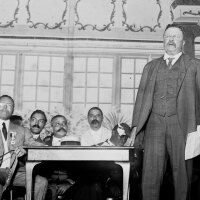The Future: How Do We Formalize Informality?

This article is part 4 of a 4-part essay about the informal economy by Pascale Joassart, co-producer of "City Rising: The Informal Economy." Read Part 1, Part 2 and Part 3.
The informal economy is widespread, diverse, and deeply tied to the formal economy. It is also full of paradoxes and contradictions: it is entrepreneurial yet exploitative; it includes small independent businesses along large corporations; some jobs generate very high income but many pay poverty wages; it is officially regulated yet effectively unregulated; it is typically hidden yet often visible; and it plays a key role in supporting communities but simultaneously marginalizes workers. All of these contradictions make it difficult to define the informal economy and to offer simple answers and solutions.
Although all forms of informal work are unregulated or unprotected, there are many different types of informal work. This often leads to confusion regarding the best way to address informality. If we loosen regulations and allow informal economic activities to grow, we may help some small entrepreneurs flourish, but we may also give larger employers permission to further exploit workers and deny them basic protections and benefits. If, instead, we re-regulate the economy and strengthen the enforcement of existing regulations and labor laws, we may improve the work arrangements of many workers, but we may also push some further underground as corporations will inevitable seek new ways to keep costs down.
A one-size-fit-all solution is unlikely to be effective at reducing abuses while supporting the workers who are providing valuable goods and services to their communities. Small entrepreneurs who “break the law” to support their families should perhaps be treated differently than large corporations that do so to make more profit at the expense of workers.


There is a growing recognition that in many places informal economic activities are sustaining and strengthening communities. In the absence of social programs and formal retailers, informal businesses supply basic goods and services and help create a sense of place and community. They also provide income-generating opportunities for residents who do not have access to formal jobs for a variety of reasons often linked to their class, race, and gender. We see that clearly in Boyle Heights, Oakland, and other urban places which have been shaped by racial segregation and isolated from the mainstream economy. These dynamics are also at play in rural areas, where the economy is struggling. In these contexts, initiatives that help formalize informal businesses could be very helpful. This could be done by stopping the criminalization of street vendors and day laborers, streamlining the permitting process for small entrepreneurs, providing access to loans, improving financial literacy, helping producers market their products, and increasing the safety of workers and consumers. For example, there have been successful efforts to organize street vendors and day laborers. There have also been promising attempts to formalize informal housing to help address the lack of affordable units. Although some may be fearful that formalizing informal work, especially by undocumented immigrants, will generate undue competition with other formal businesses and workers, evidence suggest that the economy as a whole would benefit from such a move.
In the case of blatant violations of labor laws, however, leniency is not the best approach. Here, stricter enforcement of existing laws (and perhaps new laws to deal with new types of labor arrangements such as independent contracting and gig work) is needed to ensure that employers to not shirk their responsibilities and that workers receive the protections and benefits to which they are entitled. Addressing the misclassification of workers as independent contractors is an important and pressing issue. Evidence from a new comparative study across OECD countries indicate that higher regulations or higher taxes are not related to more informality. Instead, the research shows that greater social transfers and higher levels of social protection are associated with lower employment in the informal economy. These findings suggest that re-regulating the economy is likely to reduce informality – not increase it as some neoliberal thinkers believe. In other words, we need to renew our social contract. As Centeno and Portes put it, “an informal economy will develop where and when it can,” particularly if the state lacks the capacity or the will to regulate and/or enforce existing regulation. In other words, governments have a central role to play in the formalization of the informal economy.
Regardless of the specific approach, however, solutions will require some form of collective actions and the leadership and collaboration of state agencies, nonprofits, unions, grassroot community organizations and other stakeholders to come up with a new social contract. The informal economy, however, remains poorly organized because participants are often fearful of being penalized since they too are breaking some rules, along with their employers. Recognizing the scope and diversity of the informal economy is a first step in drawing the attention of policy makers. Recently, labor unions have begun to pay attention to some sectors of the informal economy. In several cities, local government agencies are also slowly changing their attitude towards the informal economy, acknowledging its positive impacts on communities. Consumers too may have a role to play as they become aware of the effect of the informal economy on our quality of life.






